
The 2006 United Nations Security Council election began on 16 October 2006 during the 61st session of the United Nations General Assembly, held at United Nations Headquarters in New York City. The elections were for five non-permanent seats on the Security Council for two-year mandates commencing on 1 January 2007.

The 2012 United Nations Security Council election was held on 18 October 2012 during the 67th session of the United Nations General Assembly, held at the Headquarters of the United Nations in New York City. The elections were for five non-permanent seats on the UN Security Council for two-year mandates commencing on 1 January 2013 to replace the five countries whose terms expired. The countries elected were Argentina, Australia, Luxembourg, the Republic of Korea, and Rwanda with Luxembourg being elected for the first time.

The 2013 United Nations Security Council election was held on 17 October 2013 during the 68th session of the United Nations General Assembly, held at United Nations Headquarters in New York City. The Assembly elected Chad, Chile, Lithuania, Nigeria, and Saudi Arabia for five non-permanent seats on the UN Security Council for two-year mandates commencing on 1 January 2014. The following day, Saudi Arabia announced that it was declining the seat, accusing UNSC of using "double standards" and being unable to resolve important issues in the Middle East. A second round of voting therefore took place on 6 December, in which Jordan was elected to the council in lieu of Saudi Arabia.
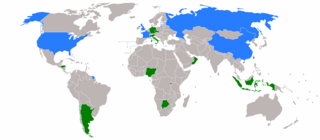
The 1994 United Nations Security Council election was held on 20 October 1994 during the Forty-ninth session of the United Nations General Assembly, held at United Nations Headquarters in New York City. The General Assembly elected Botswana, Germany, Honduras, Indonesia, and Italy, as the five new non-permanent members of the UN Security Council for two-year mandates commencing on 1 January 1995. Both Botswana and Honduras were elected for the first time, whereas Germany was elected for the first time since German reunification.
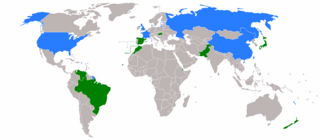
The 1992 United Nations Security Council election was held on 27 October 1992 during the Forty-seventh session of the United Nations General Assembly, held at United Nations Headquarters in New York City. The General Assembly elected Brazil, Djibouti, New Zealand, Pakistan, and Spain, as the five new non-permanent members of the UN Security Council for two-year mandates commencing on 1 January 1993.

The 1986 United Nations Security Council election was held on 16 October 1986 during the Forty-first session of the United Nations General Assembly, held at United Nations Headquarters in New York City. The General Assembly elected Argentina, Italy, Japan, West Germany, and Zambia, as the five new non-permanent members of the UN Security Council for two-year mandates commencing on 1 January 1987.

The 1985 United Nations Security Council election was held on 17 October 1985 during the Fortieth session of the United Nations General Assembly, held at United Nations Headquarters in New York City. The General Assembly elected Bulgaria, Congo, Ghana, the United Arab Emirates, and Venezuela, as the five new non-permanent members of the UN Security Council for two-year mandates commencing on 1 January 1986. 1985 marks the first election of Congo and the United Arab Emirates to the Council.

The 1984 United Nations Security Council election was held from 22 October to 18 December 1984 during the Thirty-ninth session of the United Nations General Assembly, held at United Nations Headquarters in New York City. The General Assembly elected Australia, Denmark, Madagascar, Thailand, and Trinidad and Tobago, as the five new non-permanent members of the UN Security Council for two-year mandates commencing on 1 January 1985. Madagascar, Thailand and Trinidad and Tobago were elected to Council for the first time.

The 1983 United Nations Security Council election was held on 31 October 1983 during the Thirty-eighth session of the United Nations General Assembly, held at United Nations Headquarters in New York City. The General Assembly elected Egypt, India, Peru, the Ukrainian SSR, and Upper Volta, as the five new non-permanent members of the UN Security Council for two-year mandates commencing on 1 January 1984.

The 1982 United Nations Security Council election was held on 19 October 1982 during the Thirty-seventh session of the United Nations General Assembly, held at United Nations Headquarters in New York City. The General Assembly elected Malta, the Netherlands, Nicaragua, Pakistan, and Zimbabwe, as the five new non-permanent members of the UN Security Council for two-year mandates commencing on 1 January 1983. Both Malta and Zimbabwe were elected members of the Council for the first time.

The 1981 United Nations Security Council election was held on 15 October 1981 during the Thirty-sixth session of the United Nations General Assembly, held at United Nations Headquarters in New York City. The General Assembly elected Guyana, Jordan, Poland, Togo, and Zaire, as the five new non-permanent members of the UN Security Council for two-year mandates commencing on 1 January 1982. Togo and Zaire were elected for the first time.

The 1980 United Nations Security Council election was held from 20 October to 13 November 1980 during the Thirty-seventh session of the United Nations General Assembly, held at United Nations Headquarters in New York City. The General Assembly elected Ireland, Japan, Panama, Spain, and Uganda, as the five new non-permanent members of the UN Security Council for two-year mandates commencing on 1 January 1981.
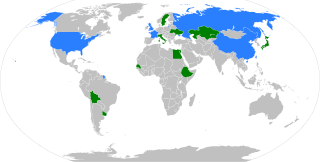
The 2016 United Nations Security Council election was held on 28 June during the 70th session of the United Nations General Assembly, held at United Nations Headquarters in New York City. The elections were for five non-permanent seats on the UN Security Council for two-year mandates commencing on 1 January 2017. In accordance with the Security Council's rotation rules, whereby the ten non-permanent UNSC seats rotate among the various regional blocs into which UN member states traditionally divide themselves for voting and representation purposes, the five available seats were allocated as follows:

The 2017 United Nations Security Council election was held on 2 June 2017 during the 71st session of the United Nations General Assembly, held at United Nations Headquarters in New York City. In addition to the regular elections for five of the non-permanent seats on the UN Security Council, there was by-election for a sixth seat held by Italy who relinquished its seat at the end of the year as part of a term splitting agreement with the Netherlands. The regular elections are for two-year mandates commencing on 1 January 2018; the by-election is for the remainder of Italy's term. In accordance with the Security Council's rotation rules, whereby the ten non-permanent UNSC seats rotate among the various regional blocs into which UN member states traditionally divide themselves for voting and representation purposes, the five regularly available seats are allocated as follows:

The 2022 United Nations Security Council election was held on 9 June 2022 during the 76th session of the United Nations General Assembly, held at United Nations Headquarters in New York City. The elections are for five non-permanent seats on the UN Security Council for two-year mandates commencing on 1 January 2023. In accordance with the Security Council's rotation rules, whereby the ten non-permanent UNSC seats rotate among the various regional blocs into which UN member states traditionally divide themselves for voting and representation purposes, the five available seats are allocated as follows:

The 1975 United Nations Security Council election was held from 20 October to 23 October 1975 during the Thirtieth session of the United Nations General Assembly, held at United Nations Headquarters in New York City. The General Assembly elected Dahomey, Libya, Pakistan, Panama, and Romania, as the five new non-permanent members of the UN Security Council for two-year mandates commencing on 1 January 1976. Benin and Libya were elected for the first time.
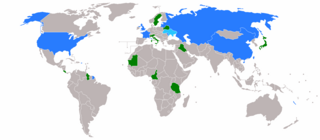
The 1974 United Nations Security Council election was held on 11 October 1974 during the Twenty-ninth session of the United Nations General Assembly, held at United Nations Headquarters in New York City. The General Assembly elected Guyana, Italy, Japan, Sweden, and Tanzania, as the five new non-permanent members of the UN Security Council for two-year mandates commencing on 1 January 1975. Both Guyana and Tanzania were elected to the council for the first time.
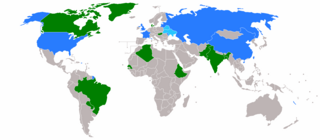
The 1967 United Nations Security Council election was held on 6 November 1967 during the Twenty-second session of the United Nations General Assembly, held at United Nations Headquarters in New York City. The General Assembly elected Algeria, Hungary, Pakistan, Paraguay, and Senegal, as the five new non-permanent members of the UN Security Council for two-year mandates commencing on 1 January 1968. Algeria and Senegal saw their first election into the council.

The 1979 United Nations Security Council election was held from 26 October 1979 to 7 January 1980 during the Thirty-fourth session of the United Nations General Assembly, held at United Nations Headquarters in New York City. The General Assembly elected East Germany, Mexico, Niger, the Philippines, and Tunisia, as the five new non-permanent members of the UN Security Council for two-year mandates commencing January 1980. Taking 155 rounds of voting to resolve, it remains the longest Security Council election in history. Additionally, this was the first time Niger was elected and the only time East Germany was elected member of the Council.

The 2023 United Nations Security Council election was held on 6 June 2023 during the 77th session of the United Nations General Assembly, held at United Nations Headquarters in New York City. The elections were for five non-permanent seats on the UN Security Council for two-year mandates commencing on 1 January 2024. In accordance with the Security Council's rotation rules, whereby the ten non-permanent UNSC seats rotate among the various regional blocs into which UN member states traditionally divide themselves for voting and representation purposes, the five available seats were allocated as follows:




















